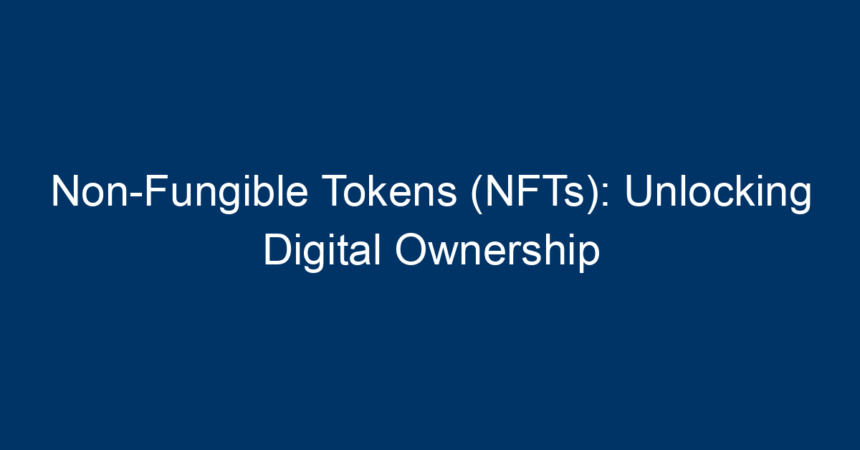In recent years, the digital landscape has undergone a remarkable transformation, largely driven by the advent of non-fungible tokens (NFTs). These unique digital assets have shifted the paradigm of ownership and value in the virtual realm. But what exactly are NFTs, and how do they impact the way we think about ownership? In this comprehensive article, we’ll explore the world of non-fungible tokens, their significance, the diverse applications they present, and actionable insights to get you started in this digital revolution.
What are Non-Fungible Tokens (NFTs)?
Non-fungible tokens are digital assets that represent ownership of a unique item or piece of content on a blockchain. Unlike cryptocurrencies like Bitcoin or Ethereum, which are fungible and can be exchanged on a one-to-one basis, NFTs are one-of-a-kind. Each NFT has distinct information or attributes that make it different from any other token, thereby establishing its uniqueness.
Key Features of NFTs
- Uniqueness: Every NFT has a unique identifier and metadata that differentiates it from others, making it irreplaceable.
- Ownership: NFT ownership is tracked on a blockchain, ensuring transparency and security. Each transaction is recorded, providing verifiable proof of ownership.
- Programmability: NFTs can include smart contracts that execute actions automatically when certain conditions are met. This can include royalties for creators every time the NFT is sold.
- Interoperability: NFTs can be transferred and utilized across various platforms, enhancing their utility in the digital ecosystem.
The Journey of NFTs: From Concept to Popularity
Early Beginnings
The concept of non-fungible tokens isn’t entirely new. The groundwork was laid with the creation of unique digital assets like Cryptokitties in 2017. Players could buy, sell, and breed virtual cats, each with its unique traits, creating a buzz around digital collectibles.
Mainstream Adoption
As the technology evolved, so did the appeal of NFTs, leading to a surge in interest from artists, musicians, and brands. By 2021, major auction houses began hosting NFT sales, and celebrities joined the hype, pushing NFT sales into the millions. This mainstream recognition transformed how digital art and collectibles were perceived, giving artists direct access to their audiences and enabling them to monetize their work.
Applications of Non-Fungible Tokens (NFTs)
NFTs have a wide range of applications across various industries:
1. Digital Art
Artists are transforming digital creation into valuable assets through NFTs. By tokenizing artwork, artists can sell their creations directly to collectors while retaining better control over their work and its distribution.
2. Gaming
In the gaming industry, NFTs facilitate the buying, selling, and trading of in-game assets such as skins, characters, and even virtual land. Players can genuinely own their digital possessions, unlike traditional games where content is often locked to accounts.
3. Music and Entertainment
Musicians are utilizing NFTs to sell exclusive content directly to fans, including unreleased tracks, concert tickets, and merchandise. This model fosters a closer connection between artists and their audience while providing new revenue streams.
4. Real Estate
Virtual real estate is another emerging area for NFTs. Digital plots of land in virtual worlds can be bought and sold as NFTs, opening up new avenues for investment and creativity in the metaverse.
5. Collectibles
NFTs have revived the collectibles market, allowing enthusiasts to own digital versions of trading cards, memorabilia, and other unique items. The rarity and proof of ownership that NFTs provide boost their appeal to collectors.
The Benefits of Non-Fungible Tokens (NFTs)
Empowering Creators
NFTs empower creators by providing them with direct access to their audiences and the ability to monetize their work without intermediaries. This democratization of content ownership is revolutionary in the creative industry.
Security and Transparency
The blockchain backbone of NFTs ensures that ownership and transaction history are secure and transparent. This significantly reduces the risk of fraud and counterfeiting, a common concern in both the art and collectibles markets.
Innovative Revenue Models
Thanks to smart contracts, creators can earn royalties on secondary sales. This means that every time an NFT is resold, the original creator can earn a percentage, providing them with continual revenue opportunities.
Challenges and Considerations
While NFTs present exciting opportunities, they also come with challenges:
Environmental Concerns
The energy consumption of blockchain networks, particularly those using proof-of-work models like Ethereum, raises concerns about the environmental impact of NFT transactions. Developers are exploring sustainable solutions, including transitioning to energy-efficient networks.
Market Volatility
The NFT market can be highly speculative, with prices fluctuating wildly. Investors should conduct thorough research and be wary of potential scams in this rapidly evolving landscape.
Legal and Copyright Issues
As NFTs are linked to digital content, copyright and ownership rights can become complicated. Creators must ensure they have the rights to tokenize their work to avoid legal disputes.
Getting Started with Non-Fungible Tokens (NFTs)
If you’re eager to dive into the world of NFTs, here are some actionable insights to help you get started:
1. Research and Education
Before investing or creating NFTs, invest time in understanding the technology. Numerous resources, courses, and communities are available to guide you.
2. Choose a Marketplace
Select an NFT marketplace that aligns with your interests. Popular platforms include OpenSea, Rarible, and Foundation, each offering unique features and audiences.
3. Create Your NFT
If you’re an artist or creator, use tools like Mintable or Rarible to create and list your NFTs. Take time to curate your work and build a brand around it.
4. Engage with the Community
Join online forums, social media groups, or Discord servers related to NFTs. Engaging with like-minded individuals can provide invaluable insights and networking opportunities.
5. Stay Updated
The world of non-fungible tokens is constantly evolving, with new trends emerging regularly. Stay informed about developments to ensure you can navigate the market effectively.
Conclusion
Non-fungible tokens (NFTs) represent a groundbreaking shift in how we view digital ownership. With their capacity to empower creators, secure transactions, and innovate revenue models, NFTs are poised to change various industries fundamentally. While challenges exist, the potential benefits far outweigh them, creating exciting opportunities for artists, investors, and collectors alike.
As you embark on your NFT journey, remember to conduct thorough research, engage with the community, and remain adaptable to the ever-changing landscape. Embrace the future of digital ownership, and unlock the vast potential that non-fungible tokens have to offer.




